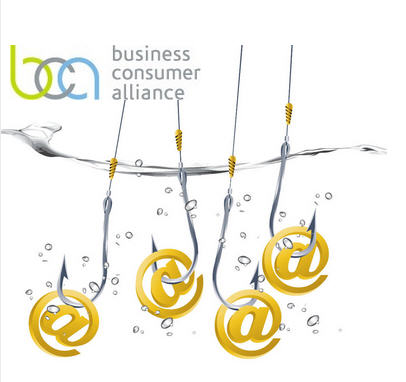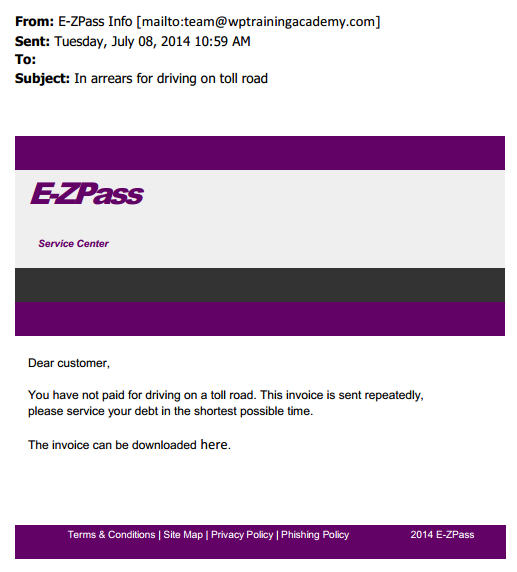Recently scammers have been busy pushing email phishing scams in an attempt to collect tolls from commuters that use E-ZPass or related toll agencies. The emails appear to be from the operators at E-ZPass, an electronic toll-collection system used on most
tolled roads, bridges, and tunnels in various parts of the United States. The email implies that previous bills sent to the recipient for driving on a toll road have not been paid and urges them to pay immediately by downloading an invoice included with the
email. Several E-ZPass operators have warned that the emails are fraudulent and that the communications are not authorized by E-ZPass or its affiliates. They ask that you not open or respond to the emails. If there is a question about any communication or
correspondence received from E-ZPass, contact your
E-ZPass Customer Service Center.

Business Consumer Alliance warns consumers to guard themselves from getting hooked by phishing scams. Some tips to remember are:
- Be cautious about opening emails from unfamiliar individuals. Be safe and even take a close look at emails you receive from familiar individuals. Hackers often hijack user accounts and use them to send spam and fraudulent emails. Here's an example of a
phishing email:

- Avoid clicking hyperlinks or downloading information from individuals you don’t know. Always hover over the link or URL in emails to reveal the address destination of the link. If it looks suspicious, or if the link in the email differs from the link you
are being directed to, don’t click it or download the material. Instead, visit the official website to view the information or offer.
- Look out for spoofed URLs. Make it a practice to enter the name of the company or offer into your browser yourself and don’t rely on links to websites found in an email.
- Be suspicious of any unsolicited email requesting personal information. Never enter your personal information on any website that you are unfamiliar with and do not email your information to anyone asking for your credit card or banking information, social
security number, identification number, or other sensitive data.
- Ignore pop-up windows. These are often tools schemers use to get you to enter your information. Close out of the window by clicking the “x” instead of the “cancel” button that may be available in the advertisement. Clicking on the button could lead you
to a fraudulent website or may contain malware or a virus.
- Think about how the business normally communicates with its customers. If in doubt, contact the business using the customer service information they provide on your statement, invoice, or official website to inquire about what you received.
- If you have been scammed, file a complaint with BCA to warn others of your experience.
Don’t let scammers get their hooks into you. For more information on recent scams and tips on how to avoid them, check out Business Consumer Alliance Scam Watch blogs and invite others to keep up-to-date
on the latest tactics being used.
About the Author
Nicole Pitts is a Senior Business Analyst and Editor for Business Consumer Alliance. She has been with the organization for 12 years and specializes in report writing, business evaluation, and investigations. Nicole corresponds with businesses regarding
complaint trends and provides suggestions to help them alleviate problem areas that may cause concern. She also conducts advertisement reviews, reports on government enforcement actions, and assists government agencies in obtaining information. She enjoys
reading, movies, and spending time with her family. Nicole can be reached by email at npitts@businessconsumeralliance.org.